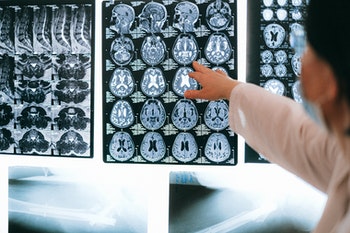Traumatic events can have a long-lasting impact and can completely change the way you live your life. This is because experiencing something traumatic can change the chemistry and structure of the brain, forcing it to stop functioning normally. Sometimes people even suffer from complex PTSD.
Experiencing or even witnessing a traumatic event can make it difficult to maintain normal relationships, hold down a job, and do simple things like grocery shopping or going out to eat. While some people struggle with life-debilitating symptoms for years, the effects of trauma don’t have to be permanent.
Your brain is incredibly powerful and can heal itself, allowing you to return to the person you used to be and live the life you once loved. This is how you know if you need childhood trauma.
How trauma affects us
When we experience trauma, our brains don’t work the way they usually do. Instead, we shift into a type of survival mode in which all our physical and mental energy is focused on dealing with the immediate threat until it’s been removed.
In many cases, being in a state of trauma fades over the course of days or a couple of weeks. But sometimes the initial trauma response we experienced doesn’t go away. This makes it incredibly difficult to function and go about our daily lives.
Experiencing a traumatic event can completely change the way we feel, think, and behave for a long time after it took place. Some people have nightmares or flashbacks of the event, while others are bothered by intrusive thoughts, being constantly on edge, or becoming self-destructive.
These are all normal ways to react to trauma, but when they last for an extended period of time, our negative actions can become a serious problem. The new patterns which you may be struggling to break on your own don’t have to be permanent. With the right support, knowledge, and approach, you can shift from survival mode to healing mode. Even children can suffer from trauma.
Your brain’s response
The effects of trauma primarily impact three parts of the brain: the amygdala, hippocampus, and prefrontal cortex.
Amygdala
The amygdala is the part of your brain that helps you acknowledge and control your emotions. It’s your emotional response center and is also partially responsible for storing emotional memories and creating a fear response.
When you experience something traumatic and show signs of PTSD (Post Traumatic Stress Disorder), it’s often because your amygdala has become more active than usual. Research has shown that the amygdala of people with PTSD increases its response to stimuli associated with the traumatic event and other fear-related stimuli.
Hippocampus
Your hippocampus is primarily responsible for your memory and ability to learn. Studies involving brain scans have revealed that the hippocampus decreases in function in people with PTSD when they’re exposed to something which they associate with the traumatic event.
This part of the brain physically changes in size following a traumatic event. People with PTSD have been found to have significantly smaller hippocampi than people who had experienced trauma but didn’t show signs of PTSD.
Prefrontal cortex
Your prefrontal cortex is in charge of higher-level thinking and reasoning. People with PTSD have been shown to experience decreased activation and function of their prefrontal cortex after being exposed to reminders of their traumatic event. This is thought to be why many people have trouble overcoming irrational fears after experiencing trauma.
Emotional abuse and PTSD is damaging >>
How therapy helps
No matter how long ago you experienced your initial traumatic event, your brain still has the power to heal itself. Overcoming trauma may be a difficult process, but changing the way your brain works is entirely possible and is something we can help you with. Sometimes, therapy makes you aware of your PTSD. People start taking therapy without knowing they have it and during their therapy they find out they suffer from it.
During therapy sessions, you’ll discuss the traumatic event with your therapist. There are many different treatment modalities to help your symptoms resolve. One type of treatment involves a deep dive into all the feelings and emotions you went through at the time, as well as the ones you’re struggling with today. Your therapist will help you pinpoint the places, experiences, and feelings that trigger your emotional response so you’re better prepared for the next time it happens.
All the different therapeutic approaches to treating trauma focus on changing the way your brain processes the event. You’ll add new pathways inside your brain, strengthen connections between certain parts, and increase the functions of specific areas. During your therapy sessions, you’ll use the same techniques to overcome your trauma that allow us to change and grow from learning.
Trauma therapy will help you rewire your brain, reversing the effects of the event. You’ll learn how to subdue your hyperactive amygdala to become calmer, strengthen your hippocampus to make your memory function properly, and reinforce your prefrontal cortex to help you think rationally.
Reach out today
Even though you may feel like you’re never going to recover from your past trauma, you can with help. The human brain is extremely adaptable and has the ability to form new connections when needed. This power allows us to rewire our brains and reverse the damaging effects of trauma.
If you’re struggling with trauma, we can help. Contact us today and make an appointment with one of our trauma therapists. It doesn’t matter whether the traumatic event took place decades or weeks ago, we can help you come to terms with what happened and process emotions you may have been ignoring.
Reach out today and take the first step on your journey to overcoming your trauma and living the life you deserve.


